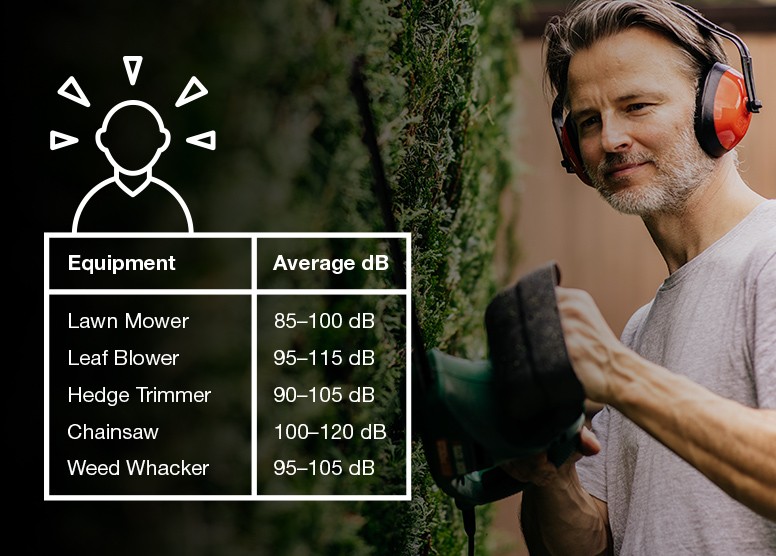How to Protect Your Hearing During National Lawn & Garden Month
As April rolls in, so does National Lawn & Garden Month—a time to dig into flower beds, fire up lawn mowers, and finally enjoy the fresh air and sunshine after a long winter. But while you're planting, pruning, or mowing your way into a beautiful yard, there's one thing you might not be thinking about: your hearing.
Many of the tools and equipment we use for lawn and garden care can expose us to dangerously high noise levels that, over time, can cause noise-induced hearing loss (NIHL). The good news? NIHL is 100% preventable with the right awareness and protection.
Let’s dig into the facts (pun intended) and share practical tips to keep your ears as healthy as your hydrangeas this season.

The Hidden Danger: Noise-Induced Hearing Loss
Noise-induced hearing loss occurs when loud sounds damage the tiny hair cells in your inner ear. These hair cells help send sound signals to your brain, but once damaged, they can’t regenerate—and that means permanent hearing loss.
You might assume hearing loss only comes from concerts or industrial jobs, but lawn and garden equipment are often just as loud. Here’s a quick snapshot of common yard tools and their average decibel (dB) levels:
Equipment Average dB Level
Lawn Mower 85–100 dB
Leaf Blower 95–115 dB
Hedge Trimmer 90–105 dB
Chainsaw 100–120 dB
Weed Whacker 95–105 dB
Sounds over 85 dB can begin damaging your hearing in just 2 hours of exposure—and the louder the sound, the faster the damage can happen. For example, at 100 dB, it can take as little as 15 minutes to cause permanent damage.
Common Garden Activities That Could Harm Your Hearing
Whether you’re a casual gardener or a landscaping enthusiast, you might be surprised how everyday tasks add up:
- Mowing the lawn without protection once a week can take a toll over time.
- Using power tools or chainsaws for pruning or removing branches exposes your ears to sudden, sharp bursts of high-decibel sound.
- Leaf blowers, even if used for short periods, can be some of the loudest culprits.
- Gas-powered trimmers and edgers produce consistent, high-pitched noise close to the ears.
If your ears ring after doing yard work, that’s a red flag. It’s a sign of temporary hearing damage—and repeated exposure can make it permanent.
How to Protect Your Hearing While Caring for Your Lawn & Garden
You don’t have to give up your gardening passion to protect your ears. Just take a few precautions:
1. Wear Hearing Protection
Invest in a good pair of noise-reducing earmuffs or earplugs. Look for an NRR (Noise Reduction Rating) of 25 or higher for loud equipment. You can find options specifically designed for landscaping and yard work at hardware stores or online.
Pro Tip: Earmuffs are great for quick on-off protection and often more comfortable for longer tasks. Earplugs can be a lightweight option but need to be inserted properly for full effectiveness.
2. Limit Your Exposure
Avoid using multiple loud tools back-to-back. Take breaks between tasks to give your ears time to recover. Even 10–15 minutes of quiet time can help reduce the risk of hearing fatigue.
3. Keep a Safe Distance
If you’re supervising someone else using loud equipment, maintain a healthy distance. Sound intensity drops the farther you are from the source—every little bit helps!
4. Maintain Your Equipment
Worn-out or poorly maintained tools can actually be louder. Sharpen blades, replace mufflers, and keep motors in good shape to reduce unnecessary noise.
5. Know the Warning Signs
If you experience ringing in your ears (tinnitus), muffled hearing after yard work, or difficulty understanding speech in noise, it could be time to schedule a hearing screening.
Celebrate National Lawn & Garden Month the Safe Way
Gardening is great for your physical and mental health—but don’t let it put your hearing at risk. With just a few small adjustments, you can enjoy the season and protect your hearing for years to come.
At Beltone, we believe in protecting your hearing before problems arise. If you’re concerned about noise exposure or have noticed changes in your hearing, we’re here to help. Schedule a free hearing screening at your local Beltone office and take the first step toward long-term hearing wellness.
Your ears deserve just as much care as your roses. Happy gardening—and happy hearing!

Online Hearing Assessment


